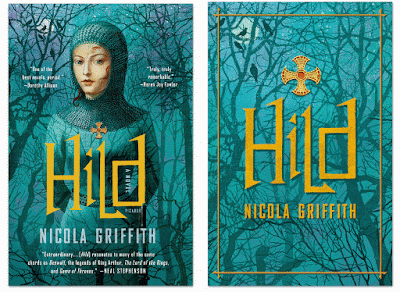Here, I'm going with a Book with a One Word Title from my Better Reading Challenge. I've chosen Hild by Nicola Griffith. This could have fulfilled a few categories: book longer than 500 pages, book by a LGBT author, and a book a friend recommended. Don't worry, it's not taking all four categories, I'm not cheating.
Hild is by an author that I like, Nicola Griffith. I've read and enjoyed Ammonite (1993) and Slow River (1995) and hated The Blue Place (1998). Man, that one was terrible. Anyway, the first two novels were science fiction, and felt like Griffith was trying on genres for size. Ammonite was clearly an homage to Le Guin and Slow River was built on Gibson and other Cyberpunk authors. Hild is where I think Griffith really comes into her own.
It's historical fiction, telling the story of the early days of Hild, who later becomes Saint Hilda. This is the story of the early conversion of England to Christianity and the tenuous role that one young girl plays in that story. Not tenuous because she's not great, merely because there are so many power plays happening that she's always in danger. What I loved about this book was the pacing. It's slow. Very slow. Reading it felt like sinking into a really comfortable bed. (I was going to say warm syrup, but I thought that might gross you all out.) The slowness of the text really gave me a chance to feel like I was in Hild's head. She's a thinker, a planner, as well as a doer. There's something rare about just engaging with a complex thought process that isn't always even tied to action.
We also get a larger perspective on women's roles in early Britain. (The book is meticulously researched, so I feel as though they aren't terribly exaggerated, but I'm not an Medievalist so buyer beware.) The relationship between female companions was fascinating, the women's roles at court are complex, and women just generally seem like competent members of society. The opposite of what we often expect based on other fantasy novels, as the NPR review notes. As an aside, Terry Jones also teaches this lesson in his Medieval Lives episode on "The Damsel:"
I highly recommend Hild if you like engaging in popular conceptions of the Medieval era. Give this a chance now that you've read all zillion pages of Game of Thrones, why dontcha?


I'm sorry to use your blogspot, but I don't know how else to contact you. Would you be in a position to review a paper, 'How monolithic knowledge construction can be challenged through the portrayal of diversity within Islam and veiling practices in selected novels'. I'm one of the editors for Literator, based at North-West University Potchefstroom. Again, apologies for the intrusion. Nicholas Meihuizen
ReplyDelete